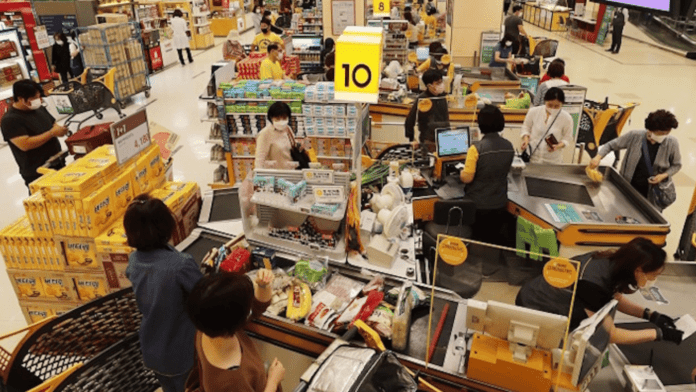South Korea’s food, cosmetics, and retail enterprises, which heavily depend on domestic sales, are reducing their workforce significantly to endure an extended downturn in domestic spending. This is perceived by some industry observers as potentially marking the most severe sequence of job cuts since the 2008 global financial crisis.
They are grappling with the triple challenge of reduced consumption due to persistent inflation and elevated interest rates, competition from inexpensive Chinese products, and government insistence to control price increases.
The string of workforce reductions in sectors centered on domestic sales may result in a subsequent decline in private spending, posing a risk of Asia’s fourth-largest economy getting caught in a detrimental cycle, caution business experts.
Since the end of last month, Lotte Mart Co. has been receiving voluntary retirement applications from employees with more than 10 years of tenure with the company, as reported by the food and distribution industry on Sunday.
In the year 2021, the supermarket chain permitted 200 employees to opt for voluntary retirement.
Over the past six years, a total of 5,600 employees have left the company through early retirement programs at its affiliate, Lotte Shopping Co.
This year, several other companies oriented toward domestic sales have either initiated workforce reductions through voluntary retirement or are currently in the process of implementing such measures.
Among them are LG H&H Co., formerly known as LG Household & Healthcare; AmorePacific Corp., a renowned cosmetics brand; Lotte Home Shopping Inc.; Maeil Dairies Co.; Paris Croissant Co., a bakery and dessert chain; and 11Street Co., an online shopping platform.
LG H&H and AmorePacific, prominent manufacturers of cosmetics and bath products in the country, experienced a 20-40% decline in operating profit during the first nine months of this year compared to the corresponding period last year. Lotte Home Shopping reported a financial loss during the same period.
The Bank of Korea predicts a modest 1.9% year-on-year increase in private spending for 2023, marking the lowest figure since the 4.8% decline observed in 2020 during the peak of the COVID-19 pandemic.
The Korea Chamber of Commerce & Industry said in its recently published “2024 Consumer Market Outlook Survey” that domestic retail sales are predicted to grow 1.6% on-year, about half the estimated 2.9% in 2023 due to deteriorating consumer sentiment and increased household debt.
“The series of job cuts could place our economy at risk of falling into a vicious circle, pushing consumption further lower, as domestic companies see greater employment effects than other industries,” said Seo Yong-gu, a professor at Sookmyung Women’s University.
E-Mart Inc., South Korea’s leading supermarket chain, has maintained stagnant operating profit margins, hovering around 1% since 2019. To put it differently, the company has been earning only 10 won or less from the sale of 1,000 won worth of goods.
This figure is below Walmart’s 4.4%, the average profit margin over the past five years, and Aeon’s 2.2% in Japan.
FnGuide’s consensus forecast anticipates that in 2023, E-Mart’s operating profit margin will decline further to 0.3%, compared to the previous year’s 0.4%.
“Domestic companies, already in the low-margin business structure, are now being pushed to their limits, hit by a decline in consumption and competition from low-priced Chinese products,” said a retail industry official.
AmorePacific recently implemented voluntary retirement for its door-to-door salesforce following a third-quarter operating profit that significantly fell short of market expectations. It recorded an operating profit of 17.2 billion won in the third quarter, approximately 52% below the consensus forecast of 36.6 billion won.
“It is beyond an earnings shock. It seems to be on the brink of a cliff,” said another industry official.“It is beyond an earnings shock. It seems to be on the brink of a cliff,” said another industry official.
AmorePacific is projected to record its lowest-ever operating profit in history, amounting to 133.3 billion won in 2023.
In June, LG H&H implemented workforce reductions via voluntary retirement, marking the first instance of the beauty and health brand conducting job cuts in the midst of a year.
The projected operating profit for 2023 is anticipated to be less than half of the 1.2 trillion won recorded in 2020.
CJ CHEILJEDANG Corp. and Daesang Corp., the top two food companies in South Korea, are no different. Both firms are expected to announce a decline in operating profit ranging from 12-21% in 2023 compared to the figures from 2022.
This stands in stark contrast to U.S. food manufacturers like Conagra Brands and Kellanova, which have consistently reported double-digit growth in operating profit.
“The increase in raw material prices and labor costs have substantially reduced our profitability,” said a food industry official.
“But we can’t pass on them to customers due to government pressure,” he said, referring to the Korean government’s requests that food companies join the government’s efforts to tame inflation.
On the other hand, duty-free shops, once considered among the primary beneficiaries of China’s relaxation of travel restrictions this year, have suffered a setback due to a lower-than-anticipated number of visitors from China.
From January to September of this year, the average monthly number of Chinese tourists visiting South Korea, as per the Hyundai Research Institute, stood at 144,000.
This figure is notably below the monthly average of 416,000 recorded between 2017 and 2019, a period during which Chinese group tours to Korea were prohibited in response to China’s objection to Seoul’s deployment of terminal high altitude area defense (THAAD) missile systems.
As per the Korea Duty Free Shop Association, sales to foreigners at domestic duty-free stores experienced a sharp decline of 34% in October, falling to $810 million compared to the corresponding period last year.
Despite discouraging domestic sales figures, some industry observers suggest that consumer sentiment appears to have reached its lowest point. This coincides with the recovery in the shipments of semiconductor chips, which constitute the country’s primary export.
Nevertheless, the predominant perspective is that domestic demand is unlikely to recover unless central banks transition away from their current tightening stance.





